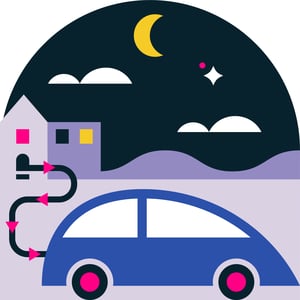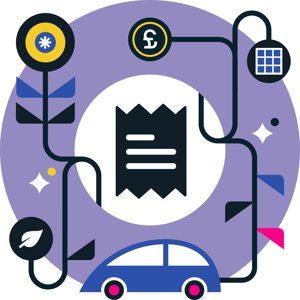Buying an electric car? Don't fear energy bill shock
If you’ve just bought an electric car, then prepare yourself: your electricity bill is probably going to shoot up. This can come as quite a shock to new electric car owners.
But, crucially, that doesn’t mean your overall outgoings are going to rise. Quite the opposite: although the upfront cost of an electric vehicle (EV) is often higher, the lower cost of electricity compared to filling up at the pumps with petrol or diesel can make them cheaper to run - not to mention far better for the environment.
So, read on and we’ll help soothe your electric vehicle bill shock.
Different ways to charge
The cost of charging your new vehicle depends on whereabouts you plug it in. The most expensive, but quickest, way to charge your car is to use a rapid charging point. These are found at motorway service stations and can charge an EV to 80% in around 30 minutes.
Some public charge points are free, but slower to boot; for example, at supermarkets or car parks while you do your shopping. Or, if you’re lucky, your employer might provide charging points where you can top up for free during working hours.
But, it’s at home where you’re most likely to power up your car. If you have a driveway or garage, installing your own charge point and using that to charge overnight will likely be your most convenient and cheapest option.

Charging at home
Charging your vehicle at home for a typical range of over 100 miles will cost approximately £4 to £6. That’s about a third of the £15 or so you would spend on diesel or petrol for an equivalent journey distance.
Put another way, a 2018 study by Vivid Economics on behalf of WWF, found that running an electric vehicle could add around £175 per year to the vehicle owner’s electricity bill. But that compares to an average of over £800 to run a new petrol or diesel car.
Ensure you’re on the right energy tariff
As with any service or charge, by doing your homework and being savvy, you can reduce your outgoings.
In fact, there’s one simple step that could totally offset any increase in your electricity bill: switch to a better value energy tariff. You could save up to £300 a year.
In particular, look for an off-peak electricity tariff. These offer cheaper energy during specified off-peak, low demand times of day, so you could benefit from charging your car using cheap overnight electricity.

Support available
Electric cars are the future and the sale of petrol and diesel cars is to be banned in the UK by 2040. To help achieve this target, the government is encouraging people to go electric. So, there are several types of financial support available, including:
- Exemption for pure battery electric vehicles (BEVs), such as the Nissan Leaf, from road tax, while Plug-in hybrid electric vehicles (PHEVs), such as the Audi e-tron, pay a reduced rate.
- A discount on brand new low-emission vehicles through the government’s OLEV Plug-in Vehicle Grant, up to a maximum of £3,500. The dealer will include the value of the grant in the vehicle’s price. Check here to see what vehicles are eligible.
- An interest-free Electric Vehicle Loan, if you live in Scotland.
There’s likely to be more types of support in future. For example, plans are being considered for all new-build homes with a dedicated car parking space to be fitted with an electric car charge point.
In the not too distant future, everyone will be driving around in electric cars.
• • •
With Loop, you can find out how you use electricity, then make smart decisions about using less - click here to find out more. We have a risk-free, no-quibble, money-back guarantee as standard, so what's to lose...apart from some £££ from your bills and some weight from your carbon footprint?







